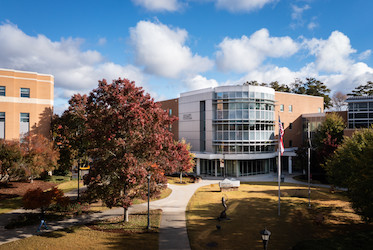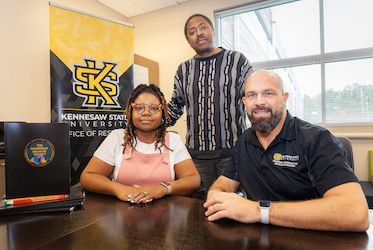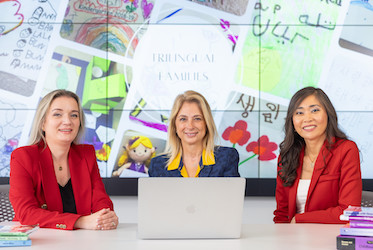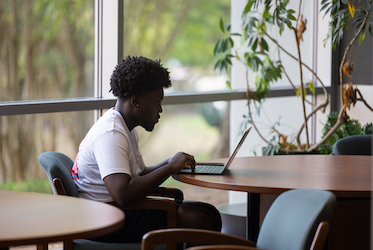
Collaboration in education
KENNESAW, Ga. | Mar 16, 2017
Faculty from Poland visit Bagwell College
As it sometimes goes, it takes an outsider to help those on the inside appreciate what they have. In the case of Kennesaw State University, students enjoy smaller classes, a more centralized campus and institutionalized student support like the KSU Writing Center – things their Polish counterparts don’t have, according to two visiting faculty from the University of Rzeszow in Poland.
In 2015, the Bagwell College of Education signed its first college-level Memorandum of Understanding with the University of Rzeszow, a collaboration that involved BCOE faculty and students traveling to Poland last summer to teach English to teacher education candidates, and University of Rzeszow faculty visiting campus to learn about education in the U.S.
In February and March, four faculty from the University of Rzeszow traveled to Kennesaw, where they visited college classes and local school districts, met with BCOE faculty to explore common interests and possible research projects and visited local attractions, including Kennesaw Mountain National Battlefield Park, the National Center for Civil and Human Rights and the Georgia Aquarium, among other activities.
“The KSU Writing Center, we don’t have anything like that,” said Jakub Czopek, who spent two weeks here along with his colleague Monika Zielinska. “Maybe some center to help students write in an academic way, that would be a good thing.”
Czopek said he and Zielinska were both struck by the “openness” of KSU students.
“American students are very open to speak about their ethnicity, sexuality, race,” Czopek said. “Polish society is a very (homogeneous) culture, and there is a lack of diversity. Our students keep that information to themselves, but I think it’s good to be open, open-minded, to share views and not judge others by how they look or who they are.”
Another difference: There is no coffee allowed in Polish classrooms, and no hoods and no hats.
“Coffee in class; hoods, hats, in Poland, no,” Zielinska said. “It’s more formal.”
The University of Rzeszow is also “scattered across the city,” so where KSU students can walk from the dorms across the street to campus, their Polish counterparts have to take the city bus to class.
“A central campus like (KSU), I think helps to build a community of students,” Czopek said. “Since we’re scattered across the city, it’s harder to build a community.”
Of course, the cultural component of any faculty or student exchange is just as important as learning about the different academic institutions. One discovery Czopek made during his sojourn in America: hot dogs with peanut butter.
“We have hot dogs in Poland, no big deal,” he said. “But a hot dog with peanut butter? Yes, it was very good!”
– Jennifer Hafer
Related Stories

Kennesaw State first in Georgia to offer master's in teacher and educational leadership

Kennesaw State receives $2.5 million grant to foster student success in calculus

Kennesaw State research aims to preserve language and culture in trilingual homes

Kennesaw State researcher explores new way to use AI for student teachers
A leader in innovative teaching and learning, Kennesaw State University offers undergraduate, graduate and doctoral degrees to its more than 45,000 students. Kennesaw State is a member of the University System of Georgia with 11 academic colleges. The university’s vibrant campus culture, diverse population, strong global ties and entrepreneurial spirit draw students from throughout the country and the world. Kennesaw State is a Carnegie-designated doctoral research institution (R2), placing it among an elite group of only 7 percent of U.S. colleges and universities with an R1 or R2 status. For more information, visit kennesaw.edu.















